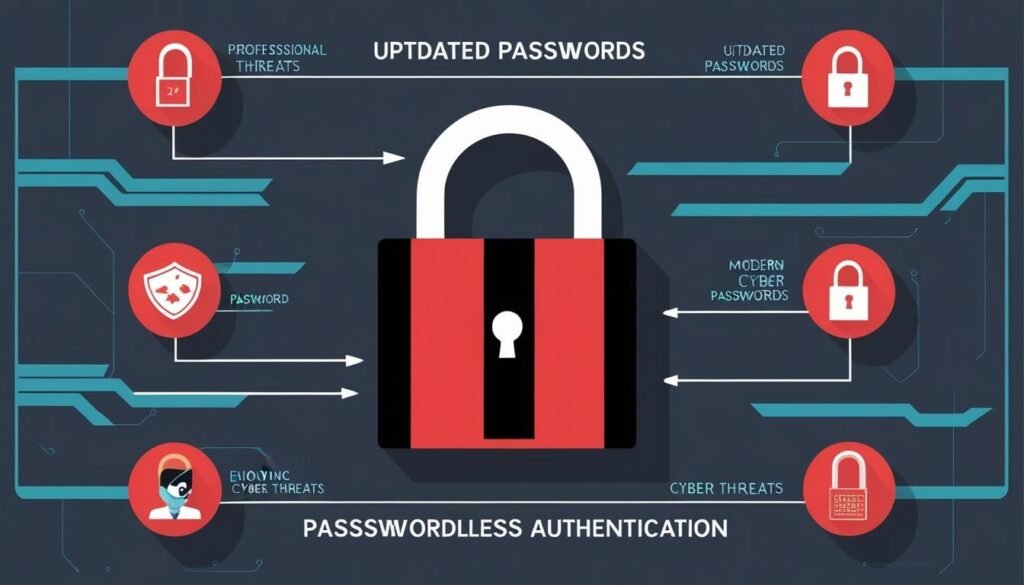As cyber threats evolve, the push for passwordless solutions is intensifying, with major tech companies leading the charge to improve online security.
As cyber threats continue to evolve, traditional security measures, particularly passwords, are increasingly viewed as vulnerabilities within digital infrastructures. Reports from Cybersecurity Insiders indicate that many organisations and individuals face the dire consequences of inadequate password practices, showcasing a pressing need for a paradigm shift in online authentication methods.
The increasing frequency and sophistication of cyberattacks underline the urgent need for change. In a stark illustration of this trend, nearly 10 billion passwords were exposed in the RockYou2024 breach, while Russian hackers compromised the accounts of 600 personnel from the UK Ministry of Defence. Such incidents highlight the systemic weaknesses associated with passwords, including users’ reliance on reusing them across multiple platforms, which markedly amplifies the risk of credential stuffing and brute force attacks.
Microsoft has signalled a significant strategic change by announcing its plans to eliminate passwords for billions of users, following a notable spike in cyberattacks targeting passworded accounts since the beginning of 2023. This announcement resonates with a broader trend, as major tech companies like Amazon are moving towards implementing passkeys, indicating a collective shift towards passwordless solutions.
Despite the clear benefits of transitioning to passwordless authentication, experts caution that the change will not occur instantaneously. The National Institute of Standards and Technology (NIST) has published updated guidance recommending that organisations encourage users to adopt longer yet simpler passwords rather than defaulting to more complex alternatives. This suggestion acknowledges that the path towards completely phasing out passwords necessitates transitional steps aimed at mitigating current vulnerabilities.
Security and convenience remain critical considerations for users. A survey reveals that while 78% prioritise security, 76% similarly value ease of use—a clear reflection of the dual demands presented by digital experiences today. Consequently, users have shown an increased interest in alternative authentication measures, such as biometric systems including facial recognition, as well as multi-factor authentication (MFA). These methods not only enhance security but also offer users a greater sense of control over their online log-in experiences.
Passwordless systems promise to meet the long-standing challenge of balancing security with user convenience. By reducing the human error factor associated with password management, these solutions can potentially lower expenses for organisations, which currently bear the costs of password management infrastructures. Single sign-on systems, a specific form of passwordless authentication, further streamline user access across myriad applications, thereby diminishing potential attack vectors.
As organisations and users gradually embrace passwordless technologies, vital steps remain to bolster online security during this transition. By adhering to NIST’s guidance and promoting the use of longer passwords along with MFA, both individuals and organisations can fortify their defences. Additionally, utilising password generation tools can enhance security even while businesses explore more sophisticated authentication models.
While the imminent transition to passwordless authentication may take time, the momentum within the tech industry suggests that change is on the horizon. As major players adopt these methods, the conversations around enhancing security in a digital landscape that continually evolves are expected to intensify, paving the way for a safer online future. The ongoing development of strong authentication protocols stands to benefit both users and organisations alike, shaping industry practices for years to come.
Source: Noah Wire Services
- https://thecyberexpress.com/rockyou2024-10-billion-password-leak/ – Corroborates the RockYou2024 breach involving nearly 10 billion unique passwords and the associated risks of credential stuffing and brute force attacks.
- https://www.mcafee.com/blogs/internet-security/rockyou2024-unpacking-the-largest-password-leak-in-history/ – Provides details on the scale and implications of the RockYou2024 password leak, including its impact on various systems and the need for enhanced security measures.
- https://www.itgovernance.co.uk/blog/rockyou2024-nearly-10-billion-unique-plaintext-passwords-leaked – Supports the information about the RockYou2024 breach, including the update from RockYou2021 and the dangers posed by password reuse.
- https://thecyberexpress.com/rockyou2024-10-billion-password-leak/ – Discusses the need for transitioning to passwordless authentication and the importance of multi-factor authentication (MFA) and other security measures during this transition.
- https://www.mcafee.com/blogs/internet-security/rockyou2024-unpacking-the-largest-password-leak-in-history/ – Highlights the importance of monitoring accounts, changing passwords, and enabling two-factor authentication to mitigate the risks associated with the RockYou2024 breach.
- https://www.itgovernance.co.uk/blog/rockyou2024-nearly-10-billion-unique-plaintext-passwords-leaked – Emphasizes the systemic weaknesses associated with passwords, including the risk of credential stuffing and brute force attacks due to password reuse.
- https://thecyberexpress.com/rockyou2024-10-billion-password-leak/ – Mentions the advice from security experts to use strong, unique passwords and password managers, and to adopt passwordless authentication and MFA.
- https://www.mcafee.com/blogs/internet-security/rockyou2024-unpacking-the-largest-password-leak-in-history/ – Supports the recommendation to use longer yet simpler passwords as a transitional step towards completely phasing out passwords, as suggested by NIST.
- https://www.itgovernance.co.uk/blog/rockyou2024-nearly-10-billion-unique-plaintext-passwords-leaked – Corroborates the need for organisations to implement stringent password policies and educate users about the risks of password reuse.
- https://thecyberexpress.com/rockyou2024-10-billion-password-leak/ – Discusses the broader trend of major tech companies moving towards passwordless solutions, such as passkeys, to enhance security and user convenience.
- https://www.mcafee.com/blogs/internet-security/rockyou2024-unpacking-the-largest-password-leak-in-history/ – Highlights the importance of identity monitoring services and other protective measures to safeguard against data breaches and identity theft.















